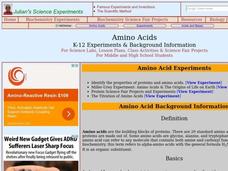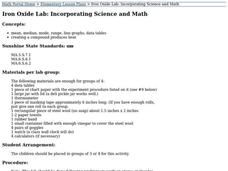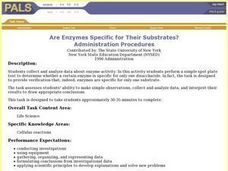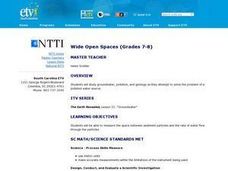Curated OER
Ions in the Environment
Students explain the importance of the five main biogeochemical cycles. In this chemistry lesson, students discuss how ions are transported in the environment. They design an experiment to collect data on eutrophication.
Curated OER
Code Makers - Electron Configuration, Aufbau Principle
Learners write the electron configuration of elements using the Aufbau principle. In this chemistry lesson, students build their own key that demonstrates the principle.
Curated OER
Water: An Endangered Resource
Learners explore the concept of watersheds. They investigate how the reclamation of abandoned coal mines in Pennsylvania improves water quality. In addition, they diagram the components and assess the value of a passive treatment system.
Curated OER
Limiting Reagent
Students work in small groups with a small set of 8 nuts and 5 bolts to assemble into combinations of 1 nut: 1 bolt, and 2 nuts: 1 bolt. They explore the outcome and discuss. Then a student mixes two clear, colorless solutions together...
Curated OER
Hydrates Worksheet
For this chemistry worksheet, students look for the concepts connected to hydrates and answer the variety of questions given for the assessment.
Curated OER
Biologically Important Molecules
In this biologically important molecules worksheet, students fill in the blank with information about carbohydrates, lipids, and proteins. Students also make notes about nucleic acids.
Curated OER
Amino Acids
Students explore what amino acids are, their history and how they are used in technology. In this protein lesson plan students identify the properties of proteins and amino acids.
Curated OER
Iron Oxide Lab: Incorporating Math and Science
Students conduct an experiment in small groups, draw conclusions about the amount heat of a compound achieves and practice their data analysis skills.
Curated OER
Are Enzymes Specific for Their Substrates?
High schoolers discover enzyme to substrate specificity. The experiment uses samples of glucose and lactose in combination with the enzyme lactase. Students observe the reaction between the lactose and the lactase; the lack of a...
Curated OER
Aquatic Habitat Water Quality Experiment
Fifth graders discuss the importance of water quality for humans and fish and make predictions about what happens to water that is polluted. In small groups, they conduct experiments to compare and contrast water that is unpolluted and...
Curated OER
What's The Matter?
Fourth graders accurately describe various states of matter, Through experimentation, they change a variable to create a new state of matter. Students record their observations about the way matter is changed and the changes that occur...
Curated OER
Wide Open Spaces
Students examine the problem of groundwater pollution. In groups, they develop a solution to solve the problem of a local polluted water source. They also practice measuring the space between sediment particles and the rate of water flow.
Curated OER
Lactose & Lactase
Students examine the characteristics of lactose and lactase. In this enzyme lesson plan students study the lactose in milk and its rate of dissolution.
Curated OER
Petroleum Poisons
Students discover how harmful petroleum distillates are that are found in the home. They demonstrate how to collect information about consumer products. They also ask their parents about the safety of the cleaning supplies used in their...
Curated OER
You say Avocado, I say Avogadro
Students convert mole to mass to particles and vice versa. In this chemistry lesson, students discuss the importance of Avogadro's number. They apply what they have learned in a team competition.
Curated OER
How Can We Accurately Make Different Solutions of Different Concentrations?
Students work together to create different solutions made from different concentrations of liquids. They record and analyze their data. They answer discussion questions to complete the lesson.
Curated OER
Natural Gas Lesson-How Natural Gas Forms
Students examine background natural gas and how it is formed and what it is made of. Titles within the series include How Natural Gas Forms, What Happens to Natural Gas when it is burned, and How Natural Gas can be used. Provides very...
Curated OER
Photosynthesis and Respiration
Eighth graders differentiate photosynthesis and respiration. In this biology instructional activity, 8th graders draw a diagram explaining these two processes. They answer a quiz after the instructional activity.
Curated OER
What is the Thermal Depolymerization Process?
Learners examine the differences between Boyle's Law and Charles' Law. They discuss the concept of thermal depolymerization. They answer discussion questions to end the lesson.
Curated OER
Acid and Base Worksheet
In this acids and bases activity, students apply the Bronsted-Lowry theory of acids and bases to write the products for the given acid-base reactions. This activity has 7 problems to solve.
Curated OER
Cycles Review
Eighth graders discuss the four major cycles of matter. In this general science lesson, 8th graders decide which of the four is the most important. They share their opinion in class.
Other popular searches
- Writing Chemical Formulas
- Naming Chemical Formulas
- Ionic Chemical Formulas
- Balancing Chemical Formulas
- Balanced Chemical Formulas
- Wrriting Chemical Formulas
- Chemical Formulas Worksheets






















